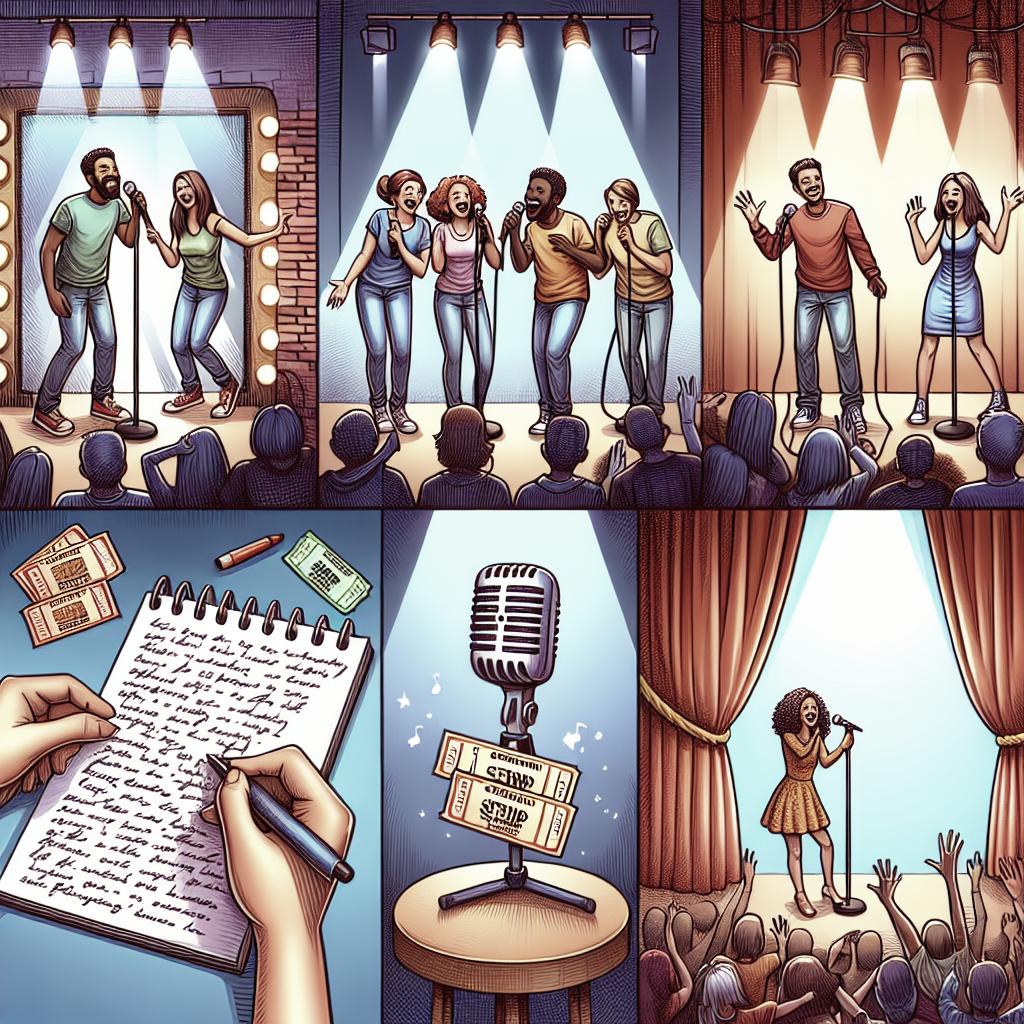How to Get into Stand-Up Comedy
Stand-up comedy is more than just making people laugh; it’s an art form that requires dedication, talent, and a lot of hard work. Whether you’re someone who has always dreamed of becoming a stand-up comedian or you’re curious about what it takes, this guide is designed to cover all aspects of getting into the stand-up comedy world. From writing jokes to performing in front of an audience and even marketing yourself, we’ll cover a comprehensive range of tips and strategies. With persistence and practice, you can turn your comedic aspirations into a reality.
TIPS FOR WRITING STAND-UP COMEDY
PICK A POINT OF VIEW (POV)
Your comedic POV shapes your entire act. It provides a lens through which you present your jokes, giving them coherence and context. Start by asking yourself what unique perspective you bring to the stage: Are you the sarcastic observer? The awkward introvert? The angry social critic? This decision will help you cultivate a distinct voice.
Having a strong POV makes your material relatable and helps the audience connect with you on a personal level. It turns generic jokes into something uniquely yours, making you memorable in a crowded field of comedians.
FIND THE COMEDIC CONFLICT
Comedy thrives on conflict. Identifying the comedic conflict in your material can elevate your jokes from good to great. This involves honing in on the inherent tension or absurdity in everyday situations – whether it’s grappling with modern technology or navigating awkward social interactions.
To find comedic conflict, think about the situations that frustrate or bewilder you, and explore why they invoke those emotions. This introspection often leads to material that is not only funnier but also more authentic.
TAP YOUR AUTHENTIC, FUNNY SELF
Audiences can easily detect when a comedian is being disingenuous. Authenticity is crucial. Dig deep into your life experiences, quirks, and opinions to tap into your authentic, funny self. Authenticity brings an undeniable charm and relatability to your performance.
Furthermore, whether you’re naturally sardonic, cheerful, or observant, let your true personality shine through. Authenticity is the bedrock of trust between you and the audience, making your material more impactful and relatable.
DON’T ATTEMPT TO BOTH WRITE AND ANALYZE YOUR MATERIAL AT THE SAME TIME
Trying to write and edit simultaneously can stifle creativity. Allow yourself to first freewrite without judgment, getting all your ideas down on paper. Once you’ve done that, you can switch hats and become the editor, refining and tweaking your material.
This separation of processes helps maintain the flow of creativity while ensuring your material is polished and ready for performance. Remember, the time for analysis comes after creation.
GET INTO FLOW
The state of “flow” is essential for creative writing. Find a time and place where distractions are minimal, and immerse yourself in your writing. This consistent practice of getting into flow will naturally produce material that’s more creative and spontaneous.
The practice of entering flow also means setting aside regular, uninterrupted time for writing. Over time, this disciplined approach will enhance the quality of your material.
LEARN THE MECHANICS OF WRITING COMEDY
Just as with any skill, understanding the mechanics of comedy writing is crucial. This includes learning about setup-punchline structure, timing, exaggeration, and the rule of three. Familiarize yourself with these fundamentals to strengthen your comedic foundation.
Studying successful comedians can offer insights into these mechanics. Observe and analyze their structure and pacing, then practice incorporating these techniques into your own writing.
WRITE EVERY DAY
Consistent practice is key to improvement. Set aside time to write every day, even if it’s just for a short period. Regular writing keeps your skills sharp and primes your mind for creativity, making it easier to develop cohesive, quality material over time.
Daily writing also means you’re constantly producing new material, which is invaluable for a comedian. The more you write, the better you’ll get at refining your comedic voice.
ALLOW IDEAS TO EVOLVE
Comedic ideas often start as rough sketches. Allow your ideas to evolve over time through continuous refining and performing. Your initial concept might branch into several different jokes or even form the backbone of a longer routine.
Revisiting old ideas with fresh eyes can provide perspectives that were initially overlooked. This iterative process helps in polishing your material and discovering new comedic angles.
DON’T JUST USE ONE WRITING STRATEGY
Variety adds richness to your comedic repertoire. Experiment with different writing techniques like brainstorming, storytelling, and even improvisational exercises. Each strategy offers a new approach to generating material, ensuring you have a diverse and robust set.
Mixing different methods also keeps the writing process exciting and prevents creative stagnation. Be open to trying new strategies and see which combinations work best for you.
CONTINUALLY SWITCH AROUND MATERIAL TO CREATE A STRONGER, MORE CONSISTENT SET
Your routine should be a living document, constantly evolving based on audience feedback and personal insights. Continually reordering and experimenting with your material will help you find the most potent sequence and flow.
By regularly tweaking your set, you’ll discover which jokes resonate most and can adjust accordingly, ensuring your performances remain sharp and effective.
DON’T WORRY ABOUT SPELLING OR GRAMMAR WHEN WRITING
When drafting material, prioritizing creativity over technical precision is essential. Your primary goal should be to capture the essence of your joke or routine. Spelling and grammar can be addressed later in the revision phase.
The creative process thrives on freedom. Let your thoughts flow unabated by concerns about correctness and revisit them with a critical eye after you’ve captured the humor.
DON’T STEAL MATERIAL
Originality is the backbone of stand-up comedy. Stealing other comedians’ material is not only unethical but also a surefire way to damage your reputation within the community. Strive to develop your unique voice and perspective.
Original material not only sets you apart but also builds your credibility and respect among peers and audiences alike. Remember, authenticity is your greatest asset.
COMEDY IS ABOUT SELF-EXPRESSION
At its core, stand-up comedy is a form of self-expression. Use your platform to share your experiences, thoughts, and viewpoints. Authentic self-expression resonates deeply with audiences and distinguishes you in a competitive field.
Remember that your unique perspective is your strongest asset. Embrace it and let it guide your material and performances.
DON’T REQUIRE PERFECTION
Striving for perfection can paralyze creativity. Accept that not every joke will land and not every set will be flawless. Allow yourself to make mistakes and learn from them.
Perfectionism can be a hindrance. Focus on progress over perfection, and you’ll find your journey in stand-up comedy much more fulfilling and productive.
TIPS FOR PERFORMING STAND-UP COMEDY
DON’T MEMORIZE EVERY WORD OF YOUR PERFORMANCE
Memorizing your material verbatim can make your set sound robotic and insincere. Aim to internalize the key points and structure of your routine without clinging to every word. This approach allows for more natural delivery and adaptability.
Being flexible with your material also helps you respond to the audience and tailor your performance on the fly, which is often necessary in live settings.
FOCUS ON WHAT YOU WANT TO TELL THE AUDIENCE, NOT ON YOURSELF
Effective comedy isn’t self-serving; it’s about creating a shared experience with your audience. Focus on the message or story you’re conveying rather than how you’re being perceived. This approach fosters a connection with the audience and makes your performance more engaging.
By centering your attention on the audience’s experience, your delivery will naturally be more open and inviting, encouraging a positive reception.
TALK TO THE AUDIENCE, NOT AT THEM
Engagement is key in live performance. Treat your set as a conversation with the audience, not a monologue. Include pauses for laughter and give yourself the space to respond to audience reactions.
This conversational style creates a more intimate and enjoyable experience for the audience, making your comedy more impactful.
PERFORM SEVERAL TIMES A WEEK
Like any skill, stand-up comedy requires constant practice. Performing several times a week helps you refine your material, improve your delivery, and gain crucial experience. Each performance is an opportunity for growth.
Regular stage time exposes you to different audiences and venues, giving you a broader understanding of how to connect with diverse crowds.
FIND A HOME VENUE
Having a regular venue provides a comfortable space to practice and develop your material. A home venue becomes a testing ground where you can experiment with new jokes and refine your act based on consistent feedback.
Furthermore, it fosters a sense of community with other comedians and regulars, offering support and camaraderie.
CREATE A SET LIST
A well-structured set list provides a roadmap for your performance. It helps you organize your material coherently, ensuring a smooth flow from one joke to the next. Make adjustments based on audience reactions to keep your set dynamic and engaging.
Review and revise your set list regularly to keep it fresh and effective, adapting it as your material evolves.
JUST BECAUSE YOU GET A LAUGH DOESN’T MEAN YOU’RE “DONE”
A joke’s first laugh is just the beginning. Continually refine and build upon your material, exploring new angles and punchlines. Even successful jokes can be enhanced with time and experience.
Revise and test variations of your jokes to discover their full potential. Never settle; always strive for improvement.
DON’T PICK ON AUDIENCE MEMBERS
While some comedians thrive on crowd work, it’s crucial to avoid alienating or belittling audience members. Humor should unite, not isolate. Always approach interactions with respect and empathy.
Building rapport with your audience rather than creating adversarial dynamics ensures a positive and inclusive atmosphere, increasing the overall success of your performance.
BALANCE WRITING AND PERFORMING
Striking a balance between writing and performing is essential. Writing alone won’t improve your stage presence, and performing without fresh material can lead to stagnation. Allocate time for both aspects to ensure continual growth.
A balanced approach allows you to stay creative and engaged, leading to more consistent and polished performances.
DON’T TAKE IT OUT ON THE AUDIENCE. IT’S NOT THEIR FAULT NOBODY SHOWED UP.
Small audiences are part of the comedy journey. Maintain a positive and professional demeanor regardless of the turnout. The quality of your performance should remain consistent, whether for five people or fifty.
Each performance is an opportunity for growth and learning. Treat every audience with respect and gratitude for their time and attention.
OPEN MICS ARE FOR TRAINING. USE THEM TO LEARN YOUR CRAFT
Open mics are invaluable for honing your skills. They provide a low-stakes environment to test new material and build stage confidence. Utilize these opportunities to experiment and learn without the pressure of a paying audience.
Regularly attending open mics also helps you network with fellow comedians and learn from their experiences, fostering a supportive community.
DON’T SPEAK FORMALLY
Comedy thrives on relatability. Use conversational language to create a genuine connection with your audience. Avoid overly formal or complex language that could create distance between you and the crowd.
Speaking naturally helps your comedy feel more authentic and approachable, resonating better with a diverse range of audiences.
TIPS FOR MARKETING YOUR STAND-UP COMEDY
GET GOOD. THEN GET SEEN
Before focusing on marketing, prioritize honing your craft. Delivering consistent, high-quality performances is the best way to build a strong reputation. Once you’ve developed a solid act, start seeking out opportunities to showcase your talent.
Quality always trumps quantity. A few standout performances will garner more positive attention than numerous mediocre ones.
BE REMARKABLE
In a crowded field, being remarkable sets you apart. Focus on developing a distinctive style, voice, and perspective that make you memorable. Whether it’s your unique approach to humor or your ability to connect with audiences, find your niche and excel in it.
Remarkable performers attract attention and opportunities, making it easier to build a successful comedy career.
BE AROUND THE SCENE. NOT AN OUTSIDER
To succeed in comedy, immerse yourself in the community. Attend shows, participate in open mics, and engage with fellow comedians. Being a visible and active participant in the scene helps you build relationships and stay informed about opportunities.
Your presence in the scene fosters connections that can lead to collaborations, bookings, and valuable advice.
DON’T BE A JERK
Professionalism and kindness go a long way. Treat everyone with respect – from fellow comedians to venue staff and audiences. Building a positive reputation is key to long-term success.
People are more likely to support and recommend someone they enjoy working with. Your attitude can open or close doors in the comedy world.
NETWORK
Networking is crucial for growth. Attend comedy festivals, join social media groups, and connect with industry professionals. Networking can lead to mentorships, collaborations, and performance opportunities.
Building a strong professional network provides support, insight, and access to valuable resources that can further your career.
USE YOUTUBE EFFECTIVELY
YouTube is a powerful platform for showcasing your comedy. Upload high-quality videos of your performances and engage with your audience through comments and social media links. Use SEO techniques to make your videos discoverable.
A well-maintained YouTube channel can attract a global audience, offering exposure and opportunities beyond live performances.
USE SOCIAL MEDIA
Social media is an essential tool for marketing. Use platforms like Twitter, Instagram, and Facebook to share content, engage with fans, and promote upcoming shows. Consistent, authentic interaction builds a loyal audience.
Social media also offers analytics to gauge your reach and impact, allowing you to refine your marketing strategies.
BE PROFESSIONAL
Professionalism is key in all interactions. Show up on time, deliver your best performance, and communicate effectively with bookers and promoters. Your professionalism reflects your dedication and reliability.
Being dependable and easy to work with can lead to repeat bookings and positive word-of-mouth.
START AN OPEN MIC IN YOUR TOWN TO GET MORE STAGE TIME
If local stage time is scarce, consider starting your own open mic. This initiative provides you and other comedians with a platform to perform and hone your craft. It also positions you as a facilitator within the community.
Organizing open mics can broaden your network, increase your stage time, and enhance your profile.
BE UNIQUE
Unique voices stand out. Embrace what makes you different and integrate it into your comedy. Whether it’s your background, experiences, or perspective, let your uniqueness shine through.
Being unique not only sets you apart but also makes you more memorable and appealing to diverse audiences.
Future Prospects
| Category | Strategies |
|---|---|
| TIPS FOR WRITING STAND-UP COMEDY | Pick a POV, Find the comedic conflict, Tap your authentic self, Write without analyzing simultaneously, Get into flow, Learn the mechanics, Write daily, Evolve ideas, Utilize multiple strategies, Rotate material, Ignore spelling/grammar during drafting, Avoid stealing, Embrace self-expression, Avoid perfectionism. |
| TIPS FOR PERFORMING STAND-UP COMEDY | Avoid memorizing verbatim, Prioritize audience message, Engage with the audience, Perform frequently, Establish a home venue, Create a set list, Continuously refine jokes, Avoid picking on audience, Balance writing/performing, Maintain professionalism regardless of turnout, Utilize open mics for practice, Speak naturally. |
| TIPS FOR MARKETING YOUR STAND-UP COMEDY | Master your craft before exposure, Be remarkable, Engage in the comedy scene, Maintain professionalism, Network effectively, Utilize YouTube, Leverage social media, Demonstrate professionalism, Organize local open mics, Emphasize uniqueness. |
| TIPS FOR BECOMING SUCCESSFUL IN STAND-UP COMEDY | Understand that being funny is fundamental, Continually learn, Embrace failure, Consider market location carefully, Learn from mentors, Maintain perspective, Be cautious with edgy content, Cultivate originality, Focus on self-improvement, Benchmark against established comedians, Work diligently, Study comedy masters, Start mastering where you are. |


